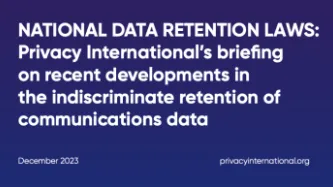Search
Content type: Long Read
Elections and political campaigns are increasingly mediated by digital technologies. These technologies rely on collecting, storing, and analysing personal information to operate. They have enabled the proliferation of tailor-made political advertising. The recent proliferation of AI technologies is enabling ever more sophisticated content creation and manipulation in the context of elections.In parallel, governments are continuing to invest in digital technologies for the running of elections…
Content type: News & Analysis
We’ve published a new tech explainer on election technologies in Kenya. The explainer takes a deep dive into the technologies employed to manage and administer the election process in Kenya, such as biometric voter registration (BVR), voter identification, results transmission, and candidate management systems.Electoral processes - along with elections themselves - are one of the largest government data-gathering exercises undertaken, making them susceptible to data exploitation and privacy…
Content type: Advocacy
When it comes to elections around the world, we find ourselves in a terrain that is more and more populated by digital technologies, which have an increasingly critical impact upon the realisation of democracy. Digital technologies used in the context of elections offer new opportunities to support voter participation, whilst simultaneously posing increasing challenges for voters and those who manage and oversee elections. The introduction of technologies into electoral systems in countries…
Content type: Explainer
Many democracies, particularly younger democracies, are increasingly looking to employ technology - including biometrics - to coordinate the running of their electoral processes. Governments give various reasons for the use of these technologies, such as transparency, voter identification, and fighting corrupt practices in attempts to increase confidence in election results.
These databases and the devices used to access and edit them are susceptible to abuse, manipulation, and theft. Moreover…
Content type: Examples
Google has settled a case brought in 2020 by the parents of an Illinois girl who sued the company in state court alleging that it had violated two sections of the Biometric Information Privacy Act. The case also alleged that Google had violated the law by failing to obtain parental consent to collect, store, and use biometric data belonging to millions of children and had illegally harvest other data such as physical location, website histories, personal contact lists, passwords, and…
Content type: Examples
Los Angeles schools superintendent Alberto Carvalho is appointing a task force to find out what went wrong and how to move forward with an AI chatbot intended to issue advice and create individual acceleration plans for every student. The company, AllHere, has apparently collapsed financially, but the school district still has no idea why. Its former manager, Chris Whiteley, has said the company implemented security and privacy in ways that violated school district policy, sound pracctice, and…
Content type: Examples
In an interview conducted by the Los Angeles Unified School District’s investigative team, Chris Whiteley, the former senior director of software engineering at AllHere, explained his concerns with the security and privacy aspects of the design of “Ed”, an AI chatbot intended to assist students. Whiteley says the chatbot placed students’ personally identifiable information at risk by including it in all chatbot prompts, even when the data wasn’t relevant. District leaders need to conduct…
Content type: Examples
Skeptics at an education conference pushed parents to question AI vendors' pitches instead of gambling children's privacy for promises of increased on-campus safety. Even so, schools are increasingly upgrading surveillance systems to incorporate AI and biometrics in the name of safety. Link to article Publication: Biometric UpdatePublication date: 2024-03-07Writer: Jim Nash
Content type: Examples
The ACLU of Maine has criticised the Caribou school district and the Pennsylvania-based biometric education company IdentiMetrics for mishandling a contract by not laying out clear plans for protecting student data. The contract was to supply a biometric finger scanner to track student attendance data; it was cancelled when parents raised concerns about data privacy. IdentiMetrics have further contracts with thousands of other school districts in 48 states. Link to articlePublication: The…
Content type: Examples
Numerous research efforts are developing facial recognition systems for use in classrooms. In one example, researchers at Guilford College are designing a system for classroom management that will use multiple cameras to take attendance, monitor students’ activities, and detect their emotional states, believing that it will reduce stress for teachers. While such use is not illegal and Guilford’s researchers say protecting student privacy is an important part of their design, the ethics and the…
Content type: Long Read
Our briefing, “When Spiders Share Webs: The creeping expansion of INTERPOL’s interoperable policing and biometrics entrench externalised EU borders in West Africa”, explores the concerning human rights implications of the use of interoperable data-driven policing capabilities and biometric technologies in West African countries rolled out by the International Criminal Police Organisation (INTERPOL)’s European Union (EU)-funded West African Police Information System (WAPIS) programme. We make a…
Content type: Long Read
The fourth edition of PI’s Guide to International Law and Surveillance provides the most hard-hitting past and recent results on international human rights law that reinforce the core human rights principles and standards on surveillance. We hope that it will continue helping researchers, activists, journalists, policymakers, and anyone else working on these issues.The new edition includes, among others, entries on (extra)territorial jurisdiction in surveillance, surveillance of public…
Content type: Advocacy
In May 2024, we made a submission for the forthcoming report of the UN Special Rapporteur on the right to education to the General Assembly in October 2024.
Amongst others we recommend the UN Special Rapporteur for this upcoming report to:
Underline the need for a human rights-based approach to all AI systems in the education sector and describe the necessary measures to achieve it.
Reassert that any interference with the right to privacy and the advancement of the right to education due to…
Content type: Long Read
IntroductionFor years PI has been documenting the market dominance and associated power of Big Tech over the digital economy, and the threats this poses to our privacy and wider rights.The digital economy is characterised by a handful of Big Tech companies that have established and maintained dominance over the digital market through opaque and exploitative practices. Big Tech exploits the data of those who use their platforms in ways which interfere with our privacy and wider rights. In…
Content type: Long Read
Social media is now undeniably a significant part of many of our lives, in the UK and around the world. We use it to connect with others and share information in public and private ways. Governments and companies have, of course, taken note and built fortunes or extended their power by exploiting the digital information we generate. But should the power to use the information we share online be unlimited, especially for governments who increasingly use that information to make material…
Content type: Long Read
Table of contentsIntroductionWeighing the (potential) benefits with the risksPrivacy rights and the right to healthThe right to healthPrivacy, data-protection and health dataThe right to health in the digital contextWhy the drive for digitalImproved access to healthcarePatient empowerment and remote monitoringBut these same digital solutions carry magnified risks…More (and more connected) dataData leaks and breachesData sharing without informed consentProfiling and manipulationTools are not…
Content type: Advocacy
At PI we have been observing with concern the rapid expansion of technologies in educational settings, which has included a wide array of tools that allow the surveillance of students and academic staff, to the detriment of their privacy and academic freedom. We consider this upcoming report as an essential platform to examine the intricate interplay between academic freedom, freedom of expression, and surveillance conducted by both public and private entities through Education…
Content type: Advocacy
While PI recognises the threats posed by cybercrime, PI reiterates the need both for a narrow scope for the proposed Convention, focusing solely on core cyber-dependent crimes, as well as for effective safeguards throughout the entire treaty to ensure human rights are respected and protected, especially in the areas of privacy and freedom of expression. Throughout the negotiations most of proposals by Member States and other stakeholders aimed at restricting the scope of the treaty and…
Content type: Advocacy
On 18 October 2023, the Inter-American Court of Human Rights (IACtHR or Court) issued a historic judgment declaring the Republic of Colombia internationally responsible for human rights violations against several members of the human rights non-profit Colectivo de Abogados y Abogadas José Alvear Restrepo (CAJAR)and their relatives. This groundbreaking decision marks the first acknowledgment within the inter-American context of a state’s international responsibility for violating the right to…
Content type: Long Read
Sports are a huge part of daily life for billions around the world, a fundamental aspect of the rich tapestry of the human experience.Attending a major sporting event can be a formative experience in someone’s life, as a place to share in a communal culture.Increasingly we have seen surveillance, and especially mass surveillance measures, being introduced at sports events impeding the enjoyment particularly of the right to privacy and right to participate in sporting life.When we saw that the…
Content type: News & Analysis
On 15 May 2024, a London Administrative Court handed down its judgment in the case of ADL & Ors v Secretary of State for the Home Department, just two months after another court judgment and a ruling of the UK's data protection authority (ICO). The four Claimants in this latest case (including asylum seekers and survivors of trafficking) were challenging the UK Home Office's policy of placing people released from immigration detention under 24/7 GPS surveillance - either by shackling them…
Content type: Long Read
IntroductionFor years PI has been exposing and advocating against the use of facial recognition technology (FRT) and the grave threats it poses to our rights. This highly invasive technology is paving the way to a dystopian, biometric surveillance state, where everyone is identified and tracked everywhere they go, in real time, as they move through public spaces during their everyday lives. Furthermore, this is taking place within a democratic vacuum, without any specific legislation pertaining…
Content type: Advocacy
The United Nations (UN) Committee on the Convention of the Rights of Persons with Disabilities (CRPD Committee) has published a damning "Report on follow-up to the inquiry concerning the United Kingdom of Great Britain and Northern Ireland" which calls upon the United Kingdom (UK) to take action against the human rights risks posed by the use of Artificial Intelligence (AI) for automated decision-making in the social security system in order to decide who can receive benefits. Published in…
Content type: Advocacy
In September 2020, the Secretary-General in September 2021 released his report Our Common Agenda, and it proposed a Global Digital Compact (GDC) which was expected to “outline shared principles for an open, free and secure digital future for all”. The GDC is expected to be agreed at the UN Summit of the Future in September 2024. Following some initial consultations, a Zero Draft of the Global Digital Compact was published on 1 April 2024, and the co-facilitators outlined…
Content type: Advocacy
Privacy International (PI) welcomes the opportunity to provide input to the forthcoming report the Special Rapporteur on contemporary forms of racism, racial discrimination, xenophobia and related tolerance to the 56th session of Human Rights Council which will examine and analyse the relationship between artificial intelligence (AI) and non-discrimination and racial equality, as well as other international human rights standards.AI applications are becoming a part of everyday life:…
Content type: Report
Over the past years, data retention regulation imposing generalised and indiscriminate data retention obligations to telecommunication companies and Internet service provides has been introduced in various jurisdictions across the world. As the data retention practices across the world have evolved this new report is an attempt to shed some light on the current state of affairs in data retention regulation across ten key jurisdictions. Privacy International has consulted with human…
Content type: Advocacy
In PI’s view the Revised Draft is a significant step back to the already weakened previous draft. Among the many concerns that we highlight in this analysis, we are particularly dismayed by the deletion of a principle on privacy, data protection and confidentiality in Article 3. In all previous drafts, the inclusion of such provision reflected the importance that data protection and privacy plays in any effective, modern public health policies. Failing to keep a specific principle on privacy…






















